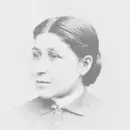
Susan LaFlesche Picotte
Susan LaFlesche Picotte was the first Native American woman to earn a medical degree. Born on the Omaha reservation in Nebraska, she was educated at the Hampton Institute in Virginia and Women’s Medical College of Pennsylvania (now Drexel University College of Medicine). A member of the Omaha tribe, she campaigned for public health and for the formal, legal allotment of land to members of the tribe. She helped other Omaha navigate the bureaucracy of the Office of Indian Affairs. She worked to discourage the consumption of alcohol on the reservation, where she served as a physician. Picotte also campaigned for the prevention and treatment of tuberculosis. From 1891 to 1893 she also served as “medical missionary” for her tribe, so designated by the Women’s National Indian Association. This dual workload included travel across the 450-square-mile Omaha reservation, making house calls in addition to receiving patients in her office.
Beyond temperance, Picotte worked on public health issues in the wider community, including school hygiene and food sanitation. In 1906, she led a delegation to Washington, D.C., to lobby for the prohibition of alcohol on the reservation. She was a founding member of the Thurston County Medical Society in 1907. Picotte was also the chair of the state health committee of the Nebraska Federation of Women’s Clubs during the first decade of the twentieth century. As chair, she spearheaded efforts to educate people about public health issues, particularly in the schools, believing that the key to fighting disease was education. She campaigned for the building of a hospital on the reservation, which was completed in 1913.